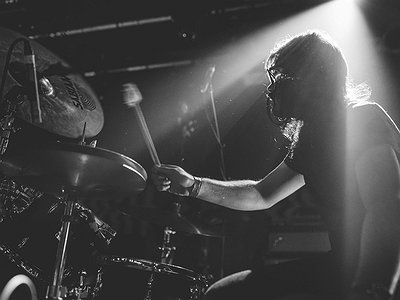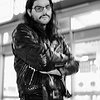Part 1
Name: Rama Parwata
Nationality: Indonesian-Balinese/Australian
Occupation: Musician, educator, composer, curator, sound artist
Current Release: Rama Parwata's solo album Tekanan is out on Cassauna / Important Records.
Recommendations: Max Roach & Archie Shepp - Force (Sweet Mao - Suid Afrika 76) (1976); Corrupted - Se Hace Por Los Suenos Asesinos (2004)
If you enjoyed this interview with Rama Parwata, the ideal point of departure into his world is his official website. He is also on Instagram and Soundcloud.
When did you start writing/producing music - and what or who were your early passions and influences? What was it about music and/or sound that drew you to it?
I’ve always had an obsession with music. My first exposure to music was Balinese Gamelan music. At a very young age, I would spend Saturday afternoons at the Indonesian consulate here in Melbourne, listening to my Balinese father practice gamelan with his friends, and I would passively absorb many of the rhythms, melodies, and patterns. Retrospectively, that early exposure was crucial to formulating an initial interest in sound and music.
Ever since I can remember, I’ve always had a natural gravitation towards drums and percussion. Much more so than any other instrument, therefore playing and developing a feel for the drumkit was a very organic process. I picked up the drums when I was around 10 or so after my uncle donated his drum kit to me, and at that time I was really into 70’s Hard Rock, like Black Sabbath and Led Zeppelin. Playing hard rock music very gradually led me down the pipeline towards extreme metal.
In my late teens I discovered jazz, which opened me up to improvisation, which then in turn led me to play and make experimental music.
For most artists, originality is preceded by a phase of learning and, often, emulating others. What was this like for you: How would you describe your own development as an artist and the transition towards your own voice?
Straight out of school, I went to university and studied to become a jazz drummer. A large portion of that educational process was centred around emulation. Transcribing Max Roach solos, learning Philly Joe Jones licks, comping in the style of Elvin Jones, etc. It’s crucially important to do that, they are the masters of the instrument. Listening to Tony Willaims records taught me tremendously about the drums, however I needed to listen with an intention of taking only elements of it to inform my own practice and not fall into the “trap” of losing my identity to become a replication of it in that emulation process.
Psychologically, we unconsciously mimic speech patterns, accents, and nonverbal signals of our peers and general broad social environments, so it makes sense that emulation within our respective music scenes is an inevitability. In that case, I’m very lucky to be in Melbourne, where many of my peers in the local experimental scene are absolutely world class, and establishments like the Make It Up Club exist to give experimental musicians a platform to perform and develop their voices.
Early on, watching many local experimental musicians perform greatly informed my musical and aesthetic praxis, with the likes of Sean Baxter, Carolyn Connors, and Marco Fusinato among others having a particularly significant impact on my early development.
How do you feel your sense of identity influences your creativity?
I’ve always been staunchly independent in a few different ways. I’ve never been able to be exclusive to one social group or music scene. I’m always shifting through different scenes and crowds. Early on, I would be considered too punk for jazz, too jazz for punk, but I eventually learned to embrace it. I guess my music goes down that path too, where it’s never stationary. I try to make my music constantly shift stylistically, and not be restrained to one genre, concept or instrument. On my debut, Tekanan, I purposely made each individual track be drastically different from the last one. I loved creating a sense of ambiguity in its direction and making the music facilitate new methods for me to improvise around the drums in new exciting ways.
My musical identity is strongly based around amalgamation. A strong benefit to having such a diverse music background is that I can draw from them and use them to influence my musical practices. I often like to take Extreme Metal/Gamelan/Jazz/Noise/R&B etc. and coalesce it into an entirely new different thing.
What were your main creative challenges in the beginning and how have they changed over time?
In the beginning, it was mainly figuring out who I really was as a musician, and finding confidence in that. I struggled to fit in when I was at jazz school, and I felt that my aesthetic and musical appreciations weren’t particularly fostered or nurtured in those particular environments.
When I first started going to avant-experimental shows, it was refreshing to know that there were people who were into the same music as me, whether it be free jazz, funk music or death metal etc. I also felt that the jazz world would have a toxic relationship of judgemental competitiveness when observing other musicians play (that I feel was fostered in it’s educational institutions), which impacted my confidence in my abilities and made me constantly question my musical capabilities and identity, therefore moving over to the experimental world made me really come out of my shell as a musician and an improviser, as playing/creating sonically challenging music was no longer seen as a “weird” thing.
It was crucial that veteran musicians and curators in that scene like Sean Baxter, Annalee Koernig, Robbie Avenaim, Marco Fusinato, Kristi Monfries, Robin Fox, Tim Pledger etc. really believed in me, took me under their wing and gave me the confidence in myself to be comfortable in my own musical skin.
As creative goals and technical abilities change, so does the need for different tools of expression, be it instruments, software tools or recording equipment. Can you describe this path for you, starting from your first studio/first instrument? What motivated some of the choices you made in terms of instruments/tools/equipment over the years?
The drum kit itself is acoustic, kinetic, and physical. It’s what you physically bring to it that ultimately decides what it is. In its primal form, there’s no electronic manipulation that you can apply to sonically alter the instrument, so for me practice and refining technique was really the path.
I started working with DAWs when I was a teenager, when I had aspirations to make electronic dance music through working with FL Studio. After a few years I eventually transferred over to Ableton, with the intention of using it for basic tracking and piquing my interest in experimenting with arrangements, it was initially nothing serious. I started to experiment with using it in non conventional ways (like internal feedback looping similar to no-input mixing, and utilizing its internal MIDI effects to facilitate aleatoric composition). After all these years I feel like I’m still discovering new things to do with it.
Have there been technologies or instruments which have profoundly changed or even questioned the way you make music?
When I started to get into experimental percussion, seeing local percussionists in the Melbourne experimental scene like Sean Baxter and Robbie Avenaim was a real epiphany. The way they expanded the possibilities of playing the drum set through abstracted methods made a strong impression on me as a young drummer, with Sean’s unconventional use of junk and cooking utensils like wok lids, wok brushes, and enamel plates to create new and exploratory textural possibilities for the drums; and Robbie's use of a Max-MSP fueled robotic drumming system he invented called SARPS (Semi Automated Robotic Percussion System) to play stochastic rhythms at humanly impossible speeds. Seeing both of those things for the first time was quite revelatory, as I was still at university studying improvisation from a strictly and somewhat conservative jazz-centred approach.
To be honest, the technology that has the most profound impact to me would be the internet as an educational tool. I’ve learnt how to use Ableton, record sounds, and mix almost exclusively from YouTube tutorials. My debut, Tekanan, was engineered and mixed all by myself.
Collaborations can take on many forms. What role do they play in your approach and what are your preferred ways of engaging with other creatives through, for example, file sharing, jamming or just talking about ideas?
Last time I counted I think I was in either nine or ten bands, so collaboration is essentially part of my musical DNA. A few of these projects are very strict “song” projects, and a few are almost entirely improvised. Sometimes bands I’m in (like Whitehorse for example) work well when nothing is written and we write together in a room with our instruments, whilst other projects work well when we write as we record in the studio. For example, I might track the drums with a rough idea of what the song would sound like, and eventually as the record starts to take shape, the initial song would be nothing like the original concept.
The only time that I’ve done any file sharing collaborating thus far was when Whitehorse did a collaborative EP with US experimental metal outfit The Body, in the lead up to our Australian tour together. They sent us some stems, and we did additional tracking on our end. I ended up tracking the drums alone in my basement studio. Additionally, we also mixed and mastered the EP ourselves. It was a bit of a rushed effort on our end due to it having to be completed in time for the tour, but it ultimately ended up being a really solid record.






